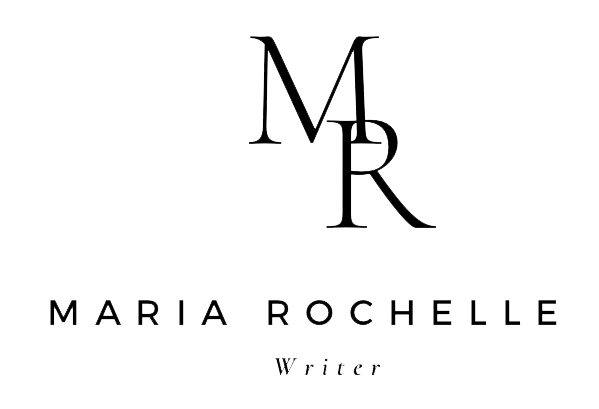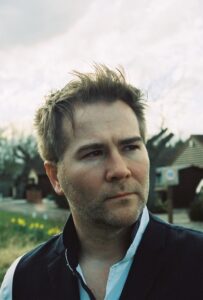
Films can transport us to another world and another place in time, all in the comfort of our home or at a local theatre. Actors in the film take us with them on their journey of the story and help us escape from our daily lives. My latest chat is with Stuart Brennan who has not only acted in films and performed on stage but also has written scripts that indeed transport you to another time like his film Kingslayer and his upcoming film Warchief which will be in theatres in October in the U.S. We talk about both of those films in our interview.
He’s from the United Kingdom and his dream wasn’t to be an actor, but a footballer. He shares with me about that transition from a footballer to actor and so much more.
Introducing Stuart…
What do you love about your life right now?
I have created Stronghold Studios, that is a production company, which sits alongside Stronghold Workshop (which designs and creates weapons, armour, props, sets, SFX and runs Stronghold Costume – Scotland’s largest costume hire company) and Stronghold Digital (which does all aspects of post production from editing to grading, sound, VFX and also runs Stronghold Records – releasing our soundtracks globally). Running all of this and creating full-time jobs for all our amazing, talented employees and investing in their careers is thrilling. It’s ensured all of our movies continue to get better and better and we’re building a sustainable structure in an otherwise turbulent industry. And we get to make the movies we want, with people we want to work with.
You’re an actor, producer, writer, and a director. I’ll also add an incredible fighter from the scenes I’ve watched in Kingslayer and Risen. Those are a few hats to wear in the film industry. Do you have a favorite and why?
Acting is what got me started and continues to be something I enjoy immensely. I love the art of writing and I’m obsessed with the challenges of directing. My least favourite is producing. The hurdles are thankless, and the hours long and the realities of business often frustrating, especially working on low, tight budgets. But that allows me to enjoy doing the others and have a healthy perspective on the industry and my career. So, no one hat entices me more than the others. I genuinely enjoy them all, but the producing hat is heaviest.
I recently watched Stalker and your co-star Sophie from Outlander was brilliant as Rose in the film, as well as calculating as well, which I mean I didn’t see what her character was going to do. I’ll add excellent writing by Chris Watt and directing by Steve Johnson. I was totally surprised which I don’t want to give away because everyone needs to watch this film. Your character, Daniel, well gave me anxiety. I thought I wouldn’t want to be alone in an elevator with this guy. What was it like for you to portray Daniel?
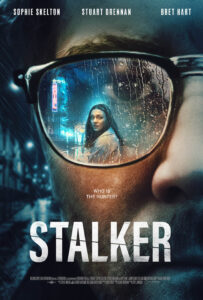
It was a horrible experience to play Daniel. He’s not someone who I connect with, but portraying someone like that you have to really let them in and look at life through their lens. He’s a loner, a person struggling with things in his life. Finding his voice helped. I worked for a long time to get the right vocality to just take the edge off my normal tone and make it a touch weaker. I stopped working out and lost weight, then I worked on his physicality; I wanted everything about him to appear weak and then the costume team gave him this great military sort of vibe, that is at total odds with the person wearing it.
It’s obviously helped that we had great writing from Chris and having Steve and Gareth Wiley (Our EP) behind the camera meant we had steady hands guiding us.
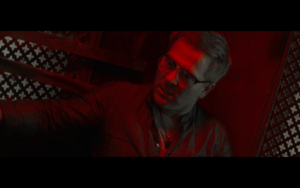
Is it harder to act in a film where there’s only one scene location, like the elevator and one other character?
Surprisingly, it was so refreshing. Normally, you barely get to meet the other cast on a film, let alone rehearse. But on this Sophie and I clicked immediately and both love rehearsing, so we put in long hours, usually 7pm til midnight each evening and 5am until 8am in the mornings. Often with Gareth Wiley sitting in with us, or giving notes. That made it absolutely thrilling. By the time the cameras rolled each day, we were both excited to bring the scene to life full throttle!
Did you see maybe the elevator as another character? I know that might be an odd question, but I kind think it has its own voice in the film
It does and I think that’s a brilliant observation, but for Daniel, he could be on the moon for all he cares. He’s in a lift with Rose Hepburn. He’s not interested in the lift at all. The only time he takes action is to find approval from Rose.
How was your experience working with Sophie?
Sophie is a true professional, smart and passionate. Working with her each day was a joy, and it was great to meet someone so dedicated. She’s great in the movie and I’d work with her again in a heartbeat.
In your opinion, what is the message of the film and what do you want others to take away?
It’s incredibly layered and long after the film has ended, different moments seem to rise back up to be considered. Chris wrote an amazing screenplay and what I admired so much was how the issues these characters are facing are woven around the thrills of the piece. What the whole team has achieved is a movie that definitely states never judge a book by its cover.
I definitely want to talk about one of your biggest wins as an actor and a writer. Risen, the film you won a BAFTA for Best Actor portraying Welsh boxer Howard Winstone, who was a World Champion Boxer. You also were honored with the title World Boxing Champion for it as well. You had mentioned to me it had taken 5 years to make, and that it was a labor of love.
That’s quite amount of time for a film to be made. Tell me about a little about this labor of love for your film Risen and what it was like to win a Bafta.
Risen is a movie that truly captured the spirit of independent filmmaking. Neil Jones (director/ producer) and I had recently graduated from university and moved to Wales together. We shot a short film about the boxer Howard Winstone and that gained some traction, including a screening at the first ever Short Film Corner at the Cannes Film Festival. From the success of that we managed to raise investment to shoot this very ambitious, period movie. During filming, an investor lied to us (and continued to do so for the next two years!). They never invested what they promised and had signed a contract to do. This meant we were in debt and had to stop filming. Over the coming years, we would raise some money, pay our debtors, film a little bit and repeat. After five years, we managed to raise enough to finish the film properly and as it had taken so long; I became eligible for the Welsh Bafta’s and was lucky enough to win Best Actor. That was a wonderful moment. We put our heart and soul into that movie. The award was recognition to all of us, Neil, Howard Winstone, his son Howard Winstone Jnr, my trainer Don James, Lyndon Baldock the investor who helped us at the end, the WBC who supported us throughout and all the amazing cast, crew and local people who supported us along the way. It really helped me personally cap off an arduous journey.
Was it your dream as a kid to be an actor and writer of films?
I wanted to be a professional footballer. I trained really hard and ended up in the finals of the National Soccer Skills competition at Manchester United. But my parents never believed in me and I was from Devon, with no links to the football world. When I was 18, they saw me in a play and suggested I do that as a career. Which was surely as wild an option as being a footballer, especially as I was planning to study law at university.
But I thought about it and I always loved acting and loved movies. So thought I’d go for it.
The writing came about early on as I realised I would have to write movies if I wanted to be in them – I didn’t know any writers.
I got offered a professional contract at 19 to go to the Maldives to play, but I turned it down to continue my journey in the arts.
I love your modern take on A Christmas Carol. You wrote the screenplay as well, portraying Scrooge. This should be on everyone’s Christmas films to watch this year. What was your inspiration for adapting it to a modern version?
I love the novella and I love the Michael Caine version. I’ve voiced a puppet version that was on stage and seen Simon Callow’s wonderful one man stage version. I simply love it. And I fell in love with Scotland and shooting movies there, so the idea of combining the two in a modern-day version really appealed to me. Now everyone is making Christmas movies and there are lots of versions, but we were ahead of that when we made ours and I think it’s got a lot of heart, a lovely cast and an incredible soundtrack by Roger Taylor (Queen). I get messages from people watching it each Christmas from all over the world and that is a really wonderful feeling.
Kingslayer, which came out in 2022, you wrote, directed and acted in the lead as Richard the Lionheart. What did you enjoy about making this one?
Bringing work to the creative industries in the middle of covid was a big deal for me. Many self-employed people fell through the gaps of the government support packages they did. I was one of them and I know many other who were also in the same boat. So getting the film made in 2020 was a big deal and had enormous challenges.
I made Kingslayer as I wanted to take the lessons I had learned from the fight scenes in Wolf and make them bigger and better, which we definitely achieved in Kingslayer. I also wanted to start the story of Richard the Lionheart, as I had been trying to get another version of the story off the ground for many years. So this smaller, more compact version was almost a proof of concept for the next one.
How much research did you do on Richard the Lionheart to portray him in the film?
I have been researching him for about ten years now. I’ve read nearly every book on him, found many Islamic sources that talk about him as well. He’s a polarising figure, with as many impressive deeds as dark ones. I spent nine months practicing for the sword fighting in the film, as we have some long unbroken takes which are dangerous to film at the best of times.
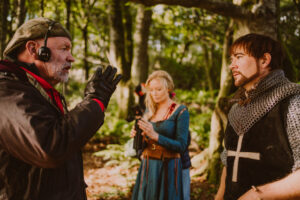
Can you share with me the challenges and joys of making films as a producer and director?
The challenge is to curtail your dreams as a director and also to find times to let them shine as a producer. It is a delicate balance. For example, if you want a thousand supporting artists as a director, as a producer, you know you can’t afford them, so you need to come up with solutions that will satisfy that vision. Older films have overcome a lot of these hurdles with some very impressive and simple techniques, and so I’m often studying films to help achieve what I want as a director. The thrill is when you pull it off and see something come together beautifully, both on time and budget and yet fulfilling the shot you wanted.
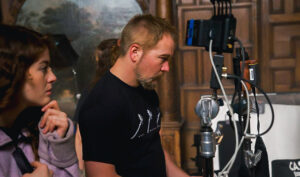
Your newest film, Warchief, how did you come up with the idea of the film? Is it based on legend or just something from your imagination?
A number of my films have a much bigger story throughline running through them all. Wolf, Necromancer, Plan Z and Warchief all are linked and so I have a rather huge tapestry of an ‘alternative history’ for the world, where myths and legendary are all true. This is the world of Abor Vitae. I have many stories with many fantastical creatures and was keen to try Orcs with Warchief, as they are so rarely done on film. I also wanted to see if it was possible to write a script where you quite like the antagonist. I’m very happy with how it worked out. Its great fun.
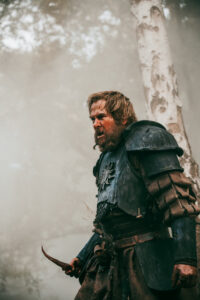
Where was it filmed?
We filmed in Suffolk in a place fittingly called ‘The Bad Lands’ – it’s a private forest. We also filmed at Butser historical park, which is an incredible site near Portsmouth.
You not only wrote the script for Warchief, you also acted in it and directed it. That’s a lot of work and creativity involved. For this film, which was easiest or hardest for you?
It’s a sum of all its parts. Each role is easier as you carry the insight of the other roles. We had a very young crew for the most part on Warchief and it was a scorching summer, so the weight of directing was definitely heavy, but the producing side had many hurdles from financiers being slow to release funds to closing down for three days because of the heat, with no insurance pay out. It was a very tough logistical 15 day shoot (that should have been 18 days).
What are you currently working on?
I have several movies in development. This year we have Assassin’s Guild and Warlord coming out and both movies I’m very proud of. We really went to town on what we could achieve with our budget and limited shooting schedules, and I believe the crew and cast really have made something very special with each film.
We all have experienced failure, and sometimes success follows it. Do you have a favorite failure?
I feel like I’m constantly learning and you only learn through failure. So I’m constantly looking at all of my work and going, I wish I knew that then, or I wish I approached this differently. Then I take that and bring it to the next project, so I know I’m constantly improving. My favourite failure was probably being rejected by ten different agents after winning the BAFTA. I thought I was going to easily get an agent after that win and that movie and yet I got ten rejections; books were full, had people like me on their books, every excuse. That’s when I realised the door was never going to open for me. I’d have to build my own door. And so I got to work.
Is there any advice you would give to someone who wants to pursue a career in the film industry?
Build your own door. Unless you’re privileged enough to be given budgets to work with, introduced to the industry and helped along; you’ll keep finding the door closed. Make the work you want to. With modern equipment these days, you can film anything, edit on almost any device. Create, learn, adapt and keep making. Each film you make must be an improvement on the last. Challenge yourself with that and keep going. Eventually, you’ll find your path and the people you enjoy working with.
If you could have a gigantic billboard anywhere with anything on it, what message would you want to convey to millions? What would it say and why?
“Self-Belief.”
It’s the cornerstone for your life. Sometimes just seeing that reminds you to take a moment, think about who you are, why you’re here, and take the steps toward what you want. It’s a lonely journey following your dreams.
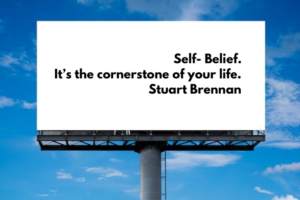
Since you’re a coffee lover and chocolate addict, do you enjoy a mocha latte? To me, that’s the best combination in the world for coffee.
YES! That’s definitely a go to pick me up drink of mine. I’m a big fan of an espresso and a piece of dark chocolate. Any combination goes for me – although I’m not a big fan of coffee flavoured chocolate – go figure?!
Describe yourself in one word.
Resilient.
I’ve got to know. Beatles or Rolling Stones? Or maybe Duran Duran?
Beatles. Although I’d put Queen ahead of them. I always turn the radio up when Queen comes on. Rolling Stones have their hits, though, too. The British music scene has always been a wonder to behold and enjoy.
Tell me three fun facts about you.
1. I have been working on a card game for the past five years. It’s my favourite hobby.
2. My puppy Druss is named after the main character of my favourite book.
3. Giving actors their first role in a movie is one of my favourite things about movie making.
I love ending the chat with a quote. Do you have a favorite quote or saying that has inspired and motivated you in your life that you can share with my readers?
Carpe Diem.
I love inspirational and motivational quotes and sayings, but the classic Carpe Diem is one I live by every day.
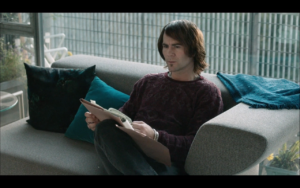
Thank you for reading my inteview with Stuart! I hope you are inspired to go for your dreams and not allow rejection to stop you in your tracks. He has learned to build door after door in the pursuit of his dreams.
Follow Stuart on social media.
